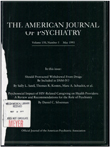HIV seroprevalence among patients admitted to two psychiatric hospitals
Abstract
OBJECTIVE: The authors determined the seroprevalence of HIV-1 among patients admitted to two psychiatric hospitals in New York City. METHOD: Patients consecutively admitted to an acute psychiatric unit in Manhattan and a large state hospital in Queens were anonymously tested for HIV-1 antibodies from December 1989 through July 1990. Test results were linked to age, gender, ethnicity, and two risk behaviors: male homosexual activity and injection drug use. RESULTS: Blood was obtained from 83.0% of the eligible patients. The prevalence of HIV was 5.5% (25 of 451). Black patients accounted for 38.0% of the patients tested and 76.0% of positive results (N = 19), a rate of 11.1% for this group. The rate of seropositivity was comparable in women and men. Clinicians had charted risk behavior for nine (36.0%) of the 25 HIV-positive patients. Infection control records suggested that clinicians were aware of seven (28.0%) of the positive cases. CONCLUSIONS: One in every 18 patients admitted to two public psychiatric hospitals in New York City was HIV positive. Clinical staff largely failed to identify HIV-positive patients. Ethnicity and a history of homosexual activity among men or use of injected drugs were strongly associated with seropositivity. This pattern of infection may be linked to needle sharing and/or sexual activity with partners who have shared needles. Future research should clarify how psychiatric illness affects risk-taking behavior, focus on improving detection by clinicians, and identify effective prevention strategies in this population.
Access content
To read the fulltext, please use one of the options below to sign in or purchase access.- Personal login
- Institutional Login
- Sign in via OpenAthens
- Register for access
-
Please login/register if you wish to pair your device and check access availability.
Not a subscriber?
PsychiatryOnline subscription options offer access to the DSM-5 library, books, journals, CME, and patient resources. This all-in-one virtual library provides psychiatrists and mental health professionals with key resources for diagnosis, treatment, research, and professional development.
Need more help? PsychiatryOnline Customer Service may be reached by emailing [email protected] or by calling 800-368-5777 (in the U.S.) or 703-907-7322 (outside the U.S.).



